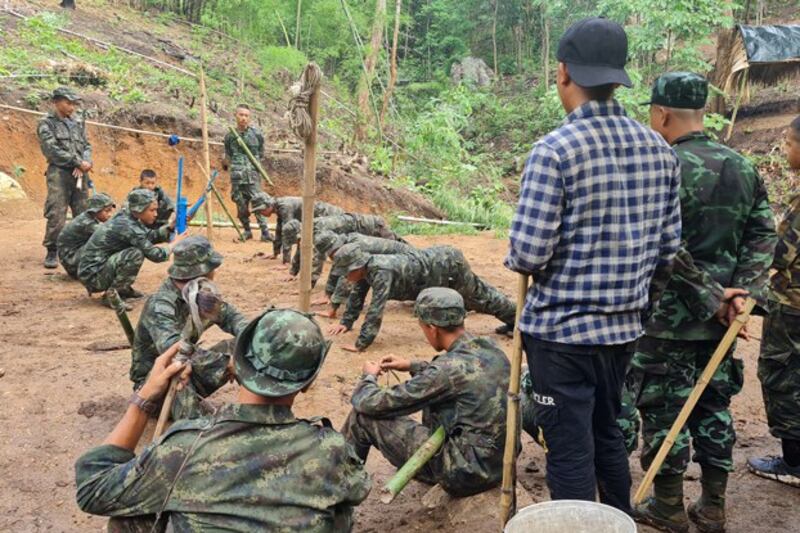The Karen National Union, Myanmar’s oldest ethnic armed group that has allied itself with the anti-junta People's Defense Forces and the shadow government made up of junta opponents, has rejected peace talks offered by Myanmar’s military regime that rules the country.
The junta made the proposal on May 9 after a leadership reshuffle during the 17th Congress of the Karen group, which has been engaged in an armed struggle for a federal democracy against the Myanmar military for more than 70 years.
The KNU held the conference online on April 24-May 4 at its headquarters on the Thai-Myanmar border in mountainous Kayin state. The group and its armed wing, the Karen National Liberation Army, operates mostly in Kayin and Mon states and the Bago and Tanintharyi regions.
KNU leaders decided that the organization and its armed wing, the Karen National Liberation Army, would join forces with other armed groups that have revolted against the junta and work towards the establishment of a federal democratic system in the country.
During the conference, the KNU named several newly elected officials to the organization’s leadership, including Padoh Saw Kwe Htoo Win, who served as vice president in the last term, as its new chair.
He was deeply involved in former peace talks between the KNU and successive Myanmar regimes, but after the February 2021 coup that brought the military to power, he was closely associated with and supported the armed resistance, according to KNU sources.
As the first ethnic armed group to publicly denounce the coup, the KNU paid dearly for its action, suffering heavy airstrikes and ground offensives after the KNLA captured a Myanmar military base and a later escalation of fighting when junta troops bombarded a site for internally displaced persons.
The KNLA also increased attacks on junta troops, sheltered protesters and trained local anti-coup forces.
Six members of the central executive committee were not re-elected, including KNU President General Saw Mutu Say Poe, who opposed armed resistance against the coup and called for a dialogue.
Rejects cease-fire
The KNU said it would fight against the military dictatorship and cooperate with other ethnic armed organizations, democratic forces and people who have been struggling for the establishment of a federal democratic union and for democracy, equality and autonomy.
KNU Central Committee member Padoh Saw Thamein Tun told RFA that it was impossible to talk with the Military Administration Council, the formal name of the junta regime, in accordance with the nationwide cease-fire agreement, or NCA.
The KNU was one of eight armed ethnic groups that signed the NCA with the national military in 2015, but its legitimacy wavered because of Myanmar military incursions into KNU-controlled areas.
“Now we can’t work under the NCA,” he told Radio Free Asia.
“What is happening now is that [ethnic-majority Bamar] chauvinism and military dictatorship prevail,” he said. “We will fight these and then establish a federal democracy.”

After the congress, the junta’s National Solidarity and Peacemaking Negotiation Committee issued a statement criticizing the KNU’s decision, saying it went against the terms of the NCA and would lead to confrontation. The committee also said holding talks would be the best way to work towards a solution for long-term peace.
KNU spokesman Padoh Saw Kler Say told local media outlets that the union did not accept the military council’s peace offer. RFA could not reach him by phone for comment.
The shadow National Unity Government said it hoped to cooperate with the new KNU leaders to speed up armed resistance to the junta this year, according to Kyaw Zaw, spokesman for the president’s office.
“We hope to work together with all the ethnic armed groups, including the KNU, to attack the common enemy, the military dictatorship, right away, and accelerate cooperation between us to topple the military dictatorship,” he said.
More fierce fighting likely
Political and military analysts said the KNU’s rejection of talks could intensify military offensives in areas it controls.
Thein Tun Oo, executive director of the Thayninga Strategic Studies Institute, a group of former Burmese military officers, believes that war will come about because the new KNU leaders are hardliners who have supported armed resistance against the national military.
“They prioritize the armed struggle rather than holding a dialogue,” he said. “If the other side chooses the hard way, the military side will respond the same way.”
Political analyst Ye Tun agreed that new KNU leaders are more inclined to fight than previous ones.
“Now, we have to say that the path of armed struggle has gained the upper hand,” he said.
Translated by Htin Aung Kyaw for RFA Burmese. Edited by Roseanne Gerin and Malcolm Foster.
